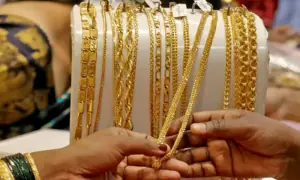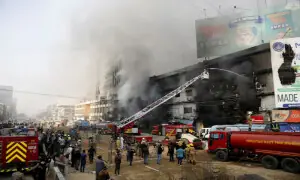Young men respond to PM's comments on rape, temptations
5 min readMuniza Zahid
Prime Minister Imran Khan’s comments on women’s clothes and temptations in society, made in an interview for Axios with Johnathan Swan on Sunday, caused a lot of outrage on social media. Not only were his comments the main subject of numerous discussions and debates on many prime time TV shows and social media, the backlash he faced earlier this year in April about his stance on rape also resurfaced.
When asked to clarify his earlier comments regarding rape which were in April seen as the prime minister blaming victims, Mr. Khan reiterated his stance by saying, “if you raise temptation in society to the point and all these young guys have nowhere to go, it has consequences in the society.”
In an unedited interview released by the Prime Minister’s House on Monday, Swan can be seen asking Khan to explain what he meant by ‘temptations’ which should be stopped. Khan responded with “material available on mobile phones,” and content in films which has become “unacceptable”, stressing how the impact this content has on “our society.”
But it was his stance on women’s dressing in Sunday’s episode as being one of those temptations that has been the focal point of much of the debate on media. His comment about men being robots if they don’t get tempted by women wearing “very few clothes” seems to have caused the most stir. While social media users like the journalist Gharida Farooqi, actor Osman Khalid Butt, and academic Arsalan Khan have turned to Twitter to talk about how Khan’s comments construed victim blaming and rape apology, I realised what was missing in this conversation was the voice of young men regarding Khan’s representation Pakistani men and culture.
I reached out to six male classmates and friends, and asked them if Khan correctly represented the men of Pakistan, and how his comments affected them. Interestingly, most of the interviewees were highly concerned with how Khan represented the men of our culture, especially through his “robots” comment.
Wasif (22) observed that if you use the Prime Minister’s definition of robots, “many people would be found to be robots or normal citizens because that's how normal people behave.” Ali (29), who requested his real name not be used, very clearly stated that, “no I don't think he represents the men of this country.”
Some men, however, looked at Khan’s words through a different angle.
Khalid (33), who also asked us not to reveal his real name, believes the Prime Minister was not representing men alone, but the whole society, and rightly so because “every society has its norms and you can’t pick one thing out of it and question it.”
Amir (33) agreed, saying that “we need to stop making everything about an attack on womanhood, and instead work on reshaping the society on the whole.”
These conflicting opinions showcase the different ways some men chose to comprehend Khan’s ideology, understanding sexual violence not as what an oppressor does to the oppressed, but something, as Khalid put it, which “works both ways.”
Anthropologist Arsalan Khan, on the other hand, explained the power dynamics behind sexual violence on Twitter by stating that rape itself is “an act of power and not just temptation.”
Wasif agreed. “ [The] Prime Minister should have not highlighted clothing to be a cause of rape, but the intoxicated mindset of gaining power over other person's body.”
Suleman (21) explained that temptations do exist, “but living in a civilisation/society, one has to have restraint upon themselves.”
While none of the men explicitly stated that women should face sexual violence if they wear “few” clothes, Khalid was vocal about how it will happen. He gave his take on Khan’s statement about the difference in social context of our society by saying that “our culture is different…if a woman goes [out] wearing immodest clothes, someone will definitely harass [her]. They [women] should have enough common sense not to do that.”
Amir had a similar point of view, declaring that “women of Pakistan should know how to dress.”
Kamran (27), however, pointed to an important implication of Khan’s comments wherein the blame of sexual violence is blamed on women’s clothes which, he says, shows a “lack of sympathy not just for women but also completely ignores all the men who are also victims of rape and sexual assault on a daily basis.”
While the Prime Minister did speak of the rising cases of sexual violence across the board, he still believed that temptations, including women’s clothes, were the root cause.
Here, Kamran, Wasif, and Suleman all dismissed the idea that linked sexual violence with women’s attire, and agreed that the implication was not only victim blaming, but also a wrong depiction of men that shows them as “inherently so barbaric that they would resort to rape at the slightest temptation,” as Twitter user and history professor Ammar Ali Jan wrote.
Another subject of debate, found both in the opinions of the interviewees and the people of social media was regarding Islam and its teachings about ‘Purdah’. Khan explained his concept of Purdah in the HBO interview as a way “to avoid temptation in society,” a conversation which led him to admit that sexual violence was caused by what women wear as well as vulgarity. This caused many people on social media to use verses from the Quran to connect it to Khan’s concept of Purdah. Twitter user Hamza stated that “[Khan] is not making any law just explaining a verse of Quran.”
Suleman disagreed, stating that, “implementation of Islam in our society has been done through a male gaze where the women are always the culprits. Imran Khan's statement does the same.”
The writer is a staff intern and student at the Institute of Business Administration in Karachi.
For the latest news, follow us on Twitter @Aaj_Urdu. We are also on Facebook, Instagram and YouTube.


























Comments are closed on this story.